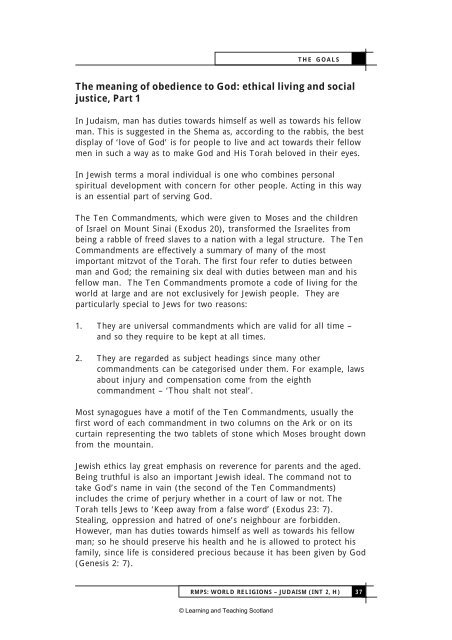RMPS - Int2/Higher - World Religions - Judaism - Education Scotland
RMPS - Int2/Higher - World Religions - Judaism - Education Scotland
RMPS - Int2/Higher - World Religions - Judaism - Education Scotland
You also want an ePaper? Increase the reach of your titles
YUMPU automatically turns print PDFs into web optimized ePapers that Google loves.
THE GOALS<br />
The meaning of obedience to God: ethical living and social<br />
justice, Part 1<br />
In <strong>Judaism</strong>, man has duties towards himself as well as towards his fellow<br />
man. This is suggested in the Shema as, according to the rabbis, the best<br />
display of ‘love of God’ is for people to live and act towards their fellow<br />
men in such a way as to make God and His Torah beloved in their eyes.<br />
In Jewish terms a moral individual is one who combines personal<br />
spiritual development with concern for other people. Acting in this way<br />
is an essential part of serving God.<br />
The Ten Commandments, which were given to Moses and the children<br />
of Israel on Mount Sinai (Exodus 20), transformed the Israelites from<br />
being a rabble of freed slaves to a nation with a legal structure. The Ten<br />
Commandments are effectively a summary of many of the most<br />
important mitzvot of the Torah. The first four refer to duties between<br />
man and God; the remaining six deal with duties between man and his<br />
fellow man. The Ten Commandments promote a code of living for the<br />
world at large and are not exclusively for Jewish people. They are<br />
particularly special to Jews for two reasons:<br />
1. They are universal commandments which are valid for all time –<br />
and so they require to be kept at all times.<br />
2. They are regarded as subject headings since many other<br />
commandments can be categorised under them. For example, laws<br />
about injury and compensation come from the eighth<br />
commandment – ‘Thou shalt not steal’.<br />
Most synagogues have a motif of the Ten Commandments, usually the<br />
first word of each commandment in two columns on the Ark or on its<br />
curtain representing the two tablets of stone which Moses brought down<br />
from the mountain.<br />
Jewish ethics lay great emphasis on reverence for parents and the aged.<br />
Being truthful is also an important Jewish ideal. The command not to<br />
take God’s name in vain (the second of the Ten Commandments)<br />
includes the crime of perjury whether in a court of law or not. The<br />
Torah tells Jews to ‘Keep away from a false word’ (Exodus 23: 7).<br />
Stealing, oppression and hatred of one’s neighbour are forbidden.<br />
However, man has duties towards himself as well as towards his fellow<br />
man; so he should preserve his health and he is allowed to protect his<br />
family, since life is considered precious because it has been given by God<br />
(Genesis 2: 7).<br />
<strong>RMPS</strong>: WORLD RELIGIONS – JUDAISM (INT 2, H) 37<br />
© Learning and Teaching <strong>Scotland</strong>
















